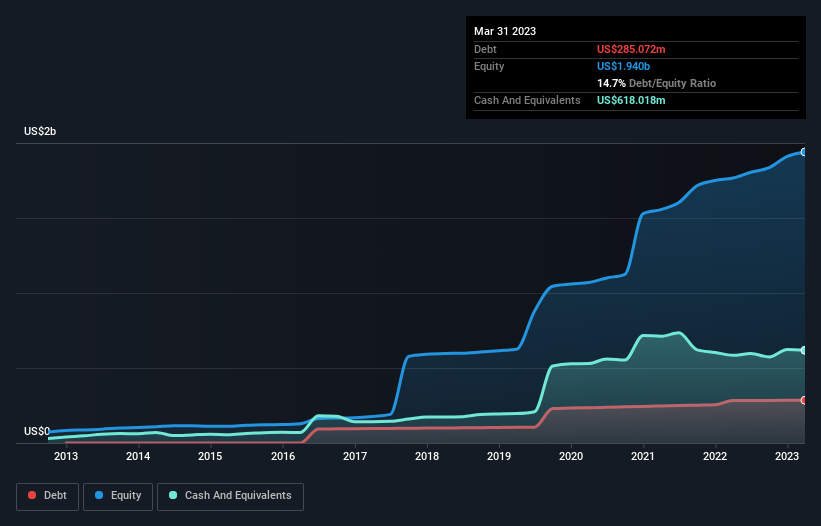
David Iben put it well when he said, 'Volatility is not a risk we care about. What we care about is avoiding the permanent loss of capital.' When we think about how risky a company is, we always like to look at its use of debt, since debt overload can lead to ruin. We can see that Repligen Corporation (NASDAQ:RGEN) does use debt in its business. But should shareholders be worried about its use of debt?
Why Does Debt Bring Risk?
Debt assists a business until the business has trouble paying it off, either with new capital or with free cash flow. If things get really bad, the lenders can take control of the business. However, a more usual (but still expensive) situation is where a company must dilute shareholders at a cheap share price simply to get debt under control. By replacing dilution, though, debt can be an extremely good tool for businesses that need capital to invest in growth at high rates of return. When we examine debt levels, we first consider both cash and debt levels, together.
See our latest analysis for Repligen
What Is Repligen's Net Debt?
As you can see below, Repligen had US$285.1m of debt, at March 2023, which is about the same as the year before. You can click the chart for greater detail. However, it does have US$618.0m in cash offsetting this, leading to net cash of US$332.9m.

How Healthy Is Repligen's Balance Sheet?
Zooming in on the latest balance sheet data, we can see that Repligen had liabilities of US$405.3m due within 12 months and liabilities of US$192.4m due beyond that. Offsetting this, it had US$618.0m in cash and US$133.5m in receivables that were due within 12 months. So it can boast US$153.8m more liquid assets than total liabilities.
Having regard to Repligen's size, it seems that its liquid assets are well balanced with its total liabilities. So while it's hard to imagine that the US$8.38b company is struggling for cash, we still think it's worth monitoring its balance sheet. Simply put, the fact that Repligen has more cash than debt is arguably a good indication that it can manage its debt safely.
On the other hand, Repligen's EBIT dived 16%, over the last year. We think hat kind of performance, if repeated frequently, could well lead to difficulties for the stock. When analysing debt levels, the balance sheet is the obvious place to start. But it is future earnings, more than anything, that will determine Repligen's ability to maintain a healthy balance sheet going forward. So if you want to see what the professionals think, you might find this free report on analyst profit forecasts to be interesting.
But our final consideration is also important, because a company cannot pay debt with paper profits; it needs cold hard cash. While Repligen has net cash on its balance sheet, it's still worth taking a look at its ability to convert earnings before interest and tax (EBIT) to free cash flow, to help us understand how quickly it is building (or eroding) that cash balance. Looking at the most recent three years, Repligen recorded free cash flow of 25% of its EBIT, which is weaker than we'd expect. That weak cash conversion makes it more difficult to handle indebtedness.
Summing Up
While it is always sensible to investigate a company's debt, in this case Repligen has US$332.9m in net cash and a decent-looking balance sheet. So we are not troubled with Repligen's debt use. Of course, we wouldn't say no to the extra confidence that we'd gain if we knew that Repligen insiders have been buying shares: if you're on the same wavelength, you can find out if insiders are buying by clicking this link.
If you're interested in investing in businesses that can grow profits without the burden of debt, then check out this free list of growing businesses that have net cash on the balance sheet.
New: AI Stock Screener & Alerts
Our new AI Stock Screener scans the market every day to uncover opportunities.
• Dividend Powerhouses (3%+ Yield)
• Undervalued Small Caps with Insider Buying
• High growth Tech and AI Companies
Or build your own from over 50 metrics.
Have feedback on this article? Concerned about the content? Get in touch with us directly. Alternatively, email editorial-team (at) simplywallst.com.
This article by Simply Wall St is general in nature. We provide commentary based on historical data and analyst forecasts only using an unbiased methodology and our articles are not intended to be financial advice. It does not constitute a recommendation to buy or sell any stock, and does not take account of your objectives, or your financial situation. We aim to bring you long-term focused analysis driven by fundamental data. Note that our analysis may not factor in the latest price-sensitive company announcements or qualitative material. Simply Wall St has no position in any stocks mentioned.
About NasdaqGS:RGEN
Repligen
Develops and commercializes bioprocessing technologies and systems for use in biological drug manufacturing process in North America, Europe, the Asia Pacific, and internationally.
Excellent balance sheet with reasonable growth potential.


